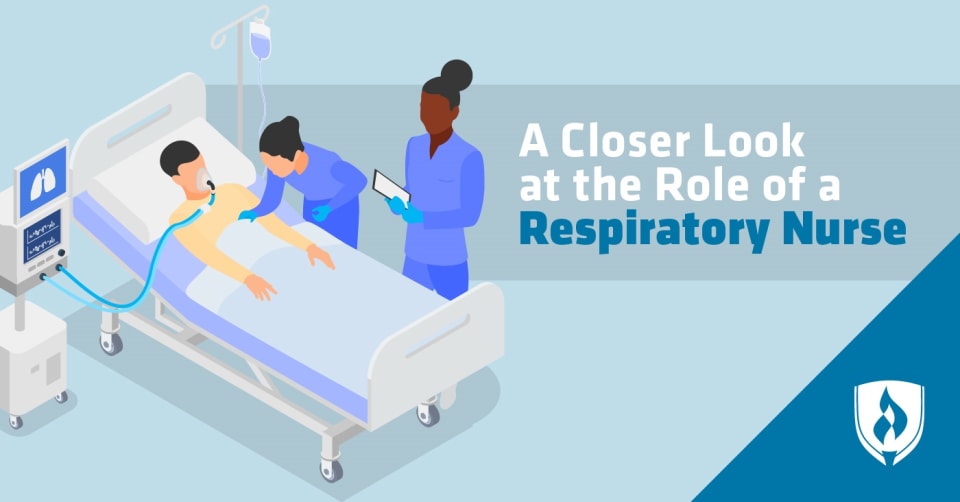Taking a deep breath might seem simple. You even do it in your sleep. However, respiration—bringing oxygen into your body and removing carbon dioxide—is a complex process that requires many physiological components working perfectly in unison.

When something goes wrong with the respiratory system, the effects can be debilitating or even fatal. Without proper respiration, a person will die in a matter of minutes. Medical advancements continue to make breakthroughs to support the quality of life for those who suffer from chronic and acute respiratory conditions. One essential part of the effort to treat respiratory conditions is the job of a healthcare professional known as a respiratory nurse.
Respiratory nurses, sometimes called pulmonary nurses, have advanced training and experience working with individuals impacted by respiratory conditions. If you are interested in a dynamic and meaningful specialty within nursing, take a moment to look closer at the role of a respiratory nurse.
Get Your Nursing School Questions Answered at a Nursing Information Session
What is a respiratory nurse?
A respiratory nurse is a specialized type of registered nurse who treats patients battling conditions that effect the respiratory system. The respiratory system is divided into the upper tract (above the vocal chords) and the lower tract (below the vocal chords). The upper tract includes areas such as your nose, sinuses, and larynx while the lower tract contains the lungs, bronchi, and alveoli. The human respiratory system is an intricate and resilient machine. However, when something goes wrong with this complex physiological system, patients need immediate, and sometimes lifelong, care.
Respiratory nurses have advanced training in the respiratory system. Some common respiratory illnesses they may encounter include asthma, pneumonia, bronchitis, emphysema, and lung cancer. Respiratory nurses may help a patient in a critical care situation or help them maintain or improve quality of life while battling a chronic condition.
Respiratory nurses will also play a big role in treating patients with COVID-19. While there’s still much to be learned about the virus and how it affects patients, respiratory issues similar to pneumonia have become a common calling card of severe cases—and those issues will often require intensive respiratory rehabilitation work.
What are common respiratory nurse job duties?
Respiratory nurses have an enormous body of knowledge in a particularly complex area of medicine. Common duties range from conducting interviews and diagnostic testing, to administering treatments such as oxygen therapy, to assisting and collaborating with physicians, respiratory therapists, and other healthcare professionals.
An important part of a respiratory nurse’s work involves working directly with patients and their families to educate about respiratory health. For chronic conditions such as asthma, patients and their families need the tools and education to manage the condition day-to-day. A respiratory nurse can provide critical care in an emergency, but they also help patients learn how to monitor and live with respiratory conditions.
Often respiratory nurses will work with patients who are receiving oxygen treatments or are dependent on ventilators to stay alive. RNs working within this specialization will need to be intimately familiar with key equipment, be aware of trouble signs like cold fingers and extremities in patients and know where to turn for next steps if a patient’s status takes a turn for the worse.
What skills do you need to be a respiratory nurse?
As in all areas of nursing, respiratory nurses need a dynamic set of skills. At the heart of respiratory nursing is patient care and education. A successful respiratory nurse has both significant technical knowledge about the respiratory system and the subtle ways respiratory conditions often present, as well as strong communication and interpersonal skills.
Where do respiratory nurses work?
Respiratory nurses most often work within a hospital setting. However, respiratory nurses may also work in clinics, doctor’s offices, assisted living facilities, and long-term care facilities. The work hours for these facilities can vary, but hospital based respiratory nurses should expect the potential for nights, weekends and other non-traditional work schedules.
What are the educational requirements for a respiratory nurse?
Respiratory nurses are registered nurses (RNs) with a broad knowledge of medicine, nursing and patient care. RNs must earn either an Associate’s Degree in Nursing or a Bachelor of Science in Nursing and also meet state licensing requirements in order to practice.
There are no universally required professional certifications tied to becoming a respiratory nurse. That said, the National Board of Respiratory Care offers a Certified Pulmonary Function Technologist (CPFT) credential to those who pass an exam. In many cases, respiratory nurses first build experience in more generalized nursing roles before getting their start in a specialized unit. That said, opportunities exist for student nurses to potentially build experience working in respiratory units, which can help smooth the way for starting a registered nursing career focused on respiratory care.
Interested in learning more about the field of nursing?
If you are interested in a valuable and respected specialty in nursing, there is a big need for respiratory nurses. The first step to becoming a respiratory nurse is to qualify as an RN. Learn more about the road ahead in our article, “How to Become a Registered Nurse: Your 4-Step Guide."




